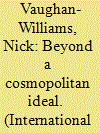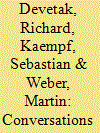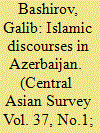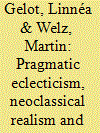| Srl | Item |
| 1 |
ID:
079473


|
|
|
|
|
| Publication |
2007.
|
| Summary/Abstract |
The aim of this paper is to explore alternative ways of thinking about ethics in world politics beyond the polis, the cosmopolis, and this tired and totalising dichotomy. However, conventional forms of political criticism are said to be inadequate to the task because the dominant theories, logics and categories through which the 'beyond' might be formulated tend to be contaminated by this very dichotomy. Therefore, drawing chiefly on the insights of Jacques Derrida and Jean-Luc Nancy, I argue that new imaginaries are required. In particular, I suggest that the concept of singularity offers theorists of international politics an alternative site around which the realm of the ethico-political may be re-conceptualised.
|
|
|
|
|
|
|
|
|
|
|
|
|
|
|
|
| 2 |
ID:
127015


|
|
|
|
|
| Publication |
2013.
|
| Summary/Abstract |
This in-depth conversation with Professor Andrew Linklater engages with his academic biography, his intellectual contribution to the field of International Relations (IR) and his reflections on the current state of, and challenges facing, the discipline of (IR). It thereby traces his biography from his undergraduate days in Aberdeen, via his first lectureships in Australia, back to the United Kingdom and eventually to Aberystwyth University; it engages with his main oeuvres from the 1982 book Men and Citizens in the Theory of International Relations to his most recent work on The Problem of Harm in World Politics, and covers the development of IR as a global discipline from the 1970s until today.
|
|
|
|
|
|
|
|
|
|
|
|
|
|
|
|
| 3 |
ID:
159215


|
|
|
|
|
| Summary/Abstract |
This article captures the dynamics of the securitization process through which new Islamic movements were constructed as an existential threat in Azerbaijan. After mapping out various competing discourses on Islam that emerged in the post-independence period, I discuss, using insights from the post-structuralist approach to securitization theory, the process of securitization of these movements. First I discuss the construction, by the hegemonic discourses, of a uniform identity category of ‘non-traditional religious movements’, and representation of otherwise different religious groups and organizations within this much stigmatized category. Later I show how the movements were constituted as an existential threat to national security and national identity through forging chains of associations between these groups and instability, chaos, social degeneration and terror. In the final section, I show how the securitizing discourse found expressions in emergency measures that were designed to deal with the movements and confirm their identity as dangerous other.
|
|
|
|
|
|
|
|
|
|
|
|
|
|
|
|
| 4 |
ID:
163373


|
|
|
|
|
| Summary/Abstract |
This article analyses the role of the African Union (AU) during the Libyan crisis of 2011. It addresses the question of why the AU has not played a central conflict manager role in that crisis. Inspired by pragmatic eclecticism, we take a theoretical detour to answer this question. Through a neoclassical realist and post-structuralist lens, we provide a novel eclectic reconsideration of the crisis response and we also highlight shared ground between both perspectives. Our theoretical and empirical discussion moves along the categories ‘primacy of power’, ‘discourses’ and ‘leader images’. We highlight the ability of dominant powers to influence the unfolding of events with material forms of power but also through immaterial ones such as the advancement of a dominant discourse on a cosmopolitan liberal order related to the responsibility-to-protect.
|
|
|
|
|
|
|
|
|
|
|
|
|
|
|
|